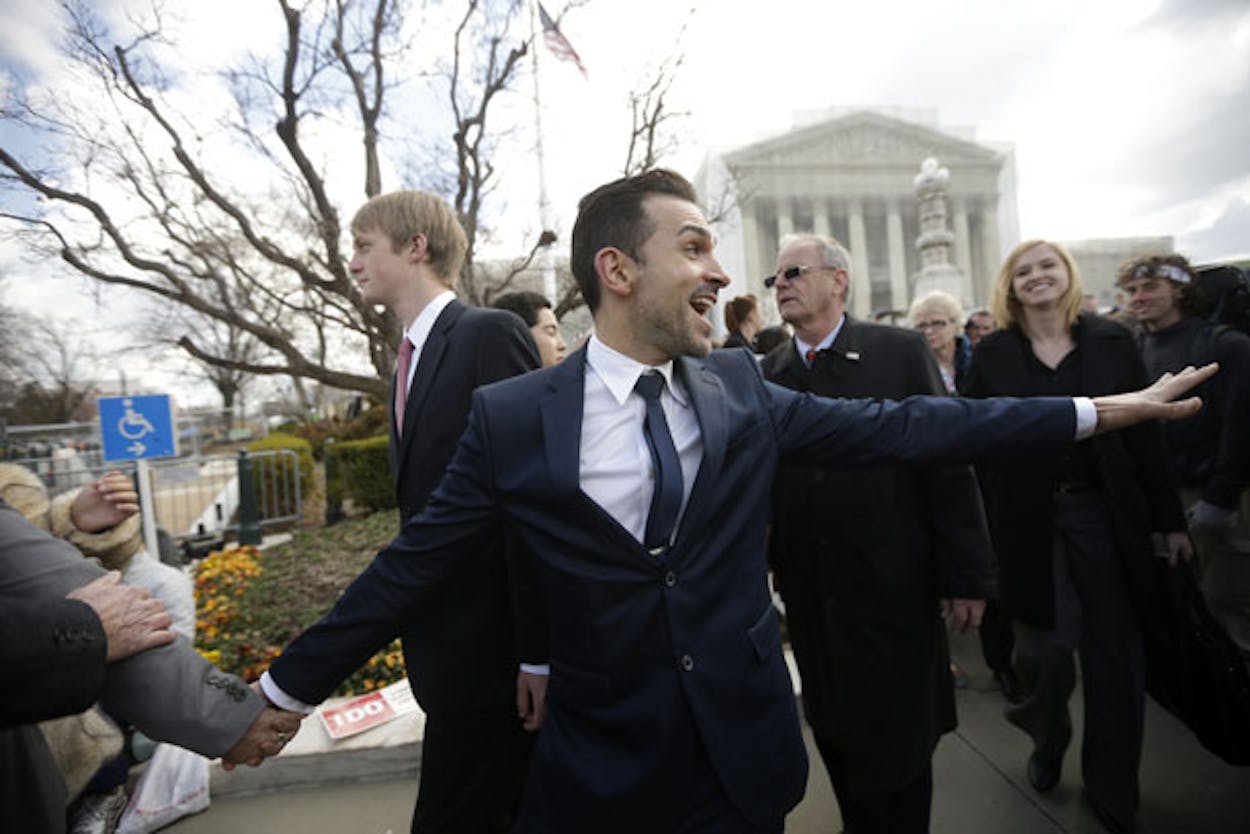The United States Supreme Court is hearing arguments on two cases related to same-sex marriage this week. The first, today, concerns the constitutionality of California’s gay marriage ban. The second, scheduled for tomorrow, is about the federal Defense of Marriage Act.
Many Texans are, no doubt, keeping a close eye on developments in Washington. Texas’s statewide leaders oppose marriage equality. “Marriage is God’s law that man applied and adopted here in Texas and the United States, and man cannot rewrite God’s law,” Attorney General Greg Abbott said yesterday. Polls show that a majority of Texans, however, support legal recognition for same-sex couples. And a Court ruling might be the easiest way to achieve that.
As with many Supreme Court cases, that is, the scope of the ruling might turn out to be just as relevant as the ruling itself. With regard to today’s case, for example, the Court could uphold California’s ban or overturn it. And if it overturns the ban, it might specify that the ruling only applies to the jurisdiction in question—or the Court might use the case at hand to offer a broader ruling on the constitutionality of such bans in other states.
The latter scenario is, basically, what happened in 1973’s Roe v. Wade. That case was about Texas laws that criminalized abortion, and the Court’s ruling asserted the legal right to abortion, under certain circumstances, across the country. As the New York Times explains, some experts—including Justice Ruth Bader Ginsburg—have expressed ambivalence about that: “It’s not that the judgment was wrong, but it moved too far, too fast,” she said last year at Columbia Law School.
The reasoning is easy to appreciate, and has been offered in other contexts: if a controversial question can be settled through legislation, the resulting laws will in some sense come from the people rather than the judges. Whether that makes the outcome more “legitimate” is debatable, but it generally seems that way; forty years after Roe, by contrast, social conservatives are still grumbling about unelected judges who legislate from the bench.
The issue of same-sex marriage is different, however, from the issue of abortion rights. There are a number of reasons for that, but let’s focus on the political side of things. Marriage equality is an issue where American public opinion has rapidly changed since the subject first appeared in mainstream discussion, about ten years ago.
The majority in favor of it is, presumably, going to grow, given the generational divide on the subject: about 70 percent of young Americans support the right to marry someone of the same gender. And yet a number of states have, in the years prior to the shift in public opinion, made it difficult for themselves to legalize same-sex marriage.
Texas is one of the states at an impasse. In 2003, the state passed a law against gay marriage. In 2005, voters approved an amendment to the state constitution specifying that marriage is between one man and one woman by a staggering margin (76 percent). By 2009, when pollsters Jim Henson and Joshua Blank started asking Texans about their views on the subject, the change was already afoot. Over at the Texas Tribune, Henson and Blank explain that their early results “caught the leading edge of a shift in public opinion on the recognition of gay relationships, particularly when respondents are given the option of civil unions instead of the binary choice of either supporting or opposing ‘gay marriage.’”
Henson and Blank’s polls don’t show how many Texans would support marriage equality if faced with a yes-or-no version of the question. Still, the trajectory is clear. “Overall opposition to same sex marriage has been on a slow and steady decline,” they write. And support for some form of legal recognition for same-sex couples has, conversely, been on the rise; the most recent polls found that 60 percent of Texans support same-sex marriage or civil unions. Similarly, Texas’s Democratic politicians are starting to express open support for the idea. On Valentine’s Day, for example, State Representative Lon Burnam filed a bill that would legalize same-sex marriage in Texas. Julian Castro, the mayor of San Antonio (who is widely seen as a future contender for statewide office) is another notable supporter.
Because of the 2005 amendment, however, it would be difficult for the state to legalize same-sex marriage, even if a majority of Texans support it. Doing so would require amending the state constitution to repeal the previous amendment, and although constitutional amendments can be ratified by a simple majority of voters, they have to be approved by a two-thirds vote in both chambers of the legislature first. Democrats have filed resolutions calling for such an amendment, but their prospects, in a fairly conservative state legislature, aren’t very good.
Setting aside the constitutional debates about how the Supreme Court should rule, then, and looking at the political side of the situation, it’s probably a safe bet that a ruling in favor of gay marriage won’t elicit the kind of backlash that Roe did. Such a ruling might not have the appearance of democratic legitimacy from a procedural perspective. Those unelected justices would, however, be in line with majority opinion.
- More About:
- Politics & Policy







